Injury Affects More Than Just Your Body: Laura Rogoski on MENTAL Zine and recovering from injury, both physically and mentally
I’ve been through some shit. I’ve struggled with injuries and depression. I broke my foot at High Cascade and had nowhere to go home to. My first doctor put me in a cast and on crutches; he said my foot would heal. Three months later, I was still in pain and a different doctor told me I needed surgery. I couldn’t afford it, I was fucked and fucking miserable. I hobbled around and worked seven days a week until I had enough money saved for surgery. I got a bone graft taken from my knee and put into my foot, along with four screws. Five months later I was riding my motorcycle and a car t-boned me. I shattered my femur, broke my pelvis, dislocated my hip, and broke my hand. The paramedic said I was lucky to be alive. I got six more surgeries over the next two years. MENTAL is a zine to put what I’ve learned from those experiences on paper. – Laura Rogoski
For Laura Rogoski, the culmination of years of battling injury and the shrapnel of mental health and addiction that accompanied it, is coming to fruition. Born in Chicago and raised in Illinois and Michigan, Laura attended the University of Vermont and became a staple in the scene at Stowe before migrating west to join the ranks of High Cascade Snowboard Camp’s notorious Digger crew. While there, her fledging career was sidelined by injury, initiating a series of events that have inextricably shaped her outlook, both on snowboarding and on life. Anyone that has watched Laura ride, whether at a street spot or in the park, can see her determination. When she puts her mind to something, she’s one of the most hell-bent out there. This mentality is a source of power in her riding and now, after lots of time spent working on her body and her mind, including checking herself into an out-patient rehab for alcohol addiction this past spring, of purpose in her life. On August 20th, Laura is releasing MENTAL, a zine she created that shares her experiences dealing with the mental and emotional struggles of injury and how she was able to carry on. Her hope? That maybe her journey could help someone else out there. MENTAL is going to be released at “You, Me, Us”, an art show Laura has put together with photographer Gill Montgomery and Vermont-based rider Tucker Speer. “You, Me, Us” will have a show in Colorado and one in Utah, as well as in-person silent auction and art sale in order to raise money to fund mental health resources. We spoke with Laura about how everything came together. – Mary T. Walsh
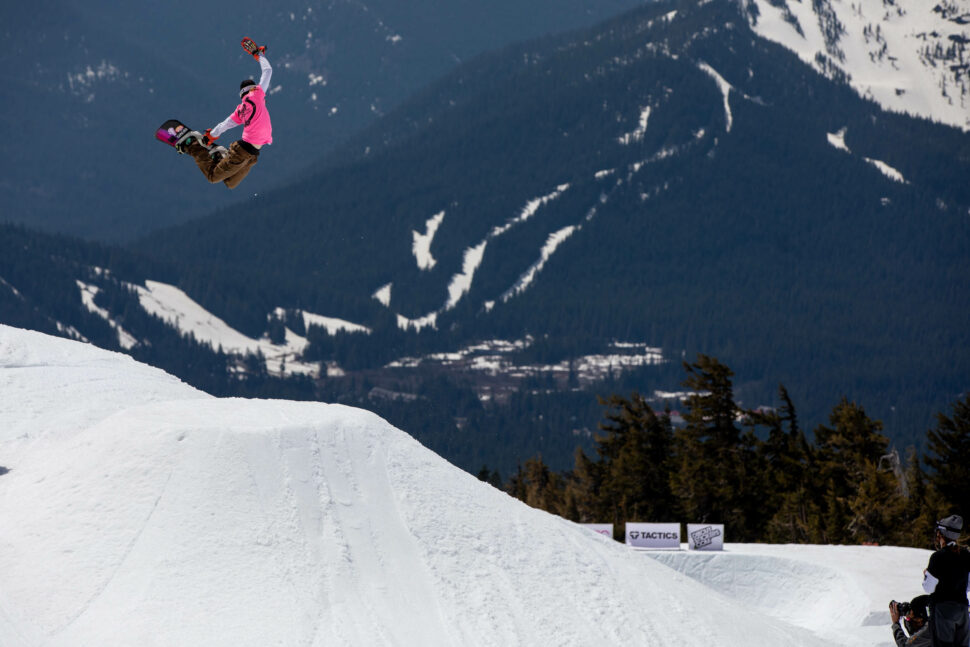 Laura Rogoski kicks out a method during Snowboy Productions’ IT’S TITS! in May 2021. p: Walsh
Laura Rogoski kicks out a method during Snowboy Productions’ IT’S TITS! in May 2021. p: WalshHow did “You, Me, Us” come together?
Gill Montgomery was working at a greenhouse that held a bunch of events prior to COVID. She was talking with her boss about art and the idea was born. She called me and Tucker individually to ask if we were interested. The three of us scheduled a Facetime call. Gill suggested that we do the art show as a fundraiser. My initial thoughts were, “Fuck that! Rehab is expensive. I could use the money.” But the opportunity to do something bigger seemed right. My mind started spinning on how expensive and inaccessible therapy is. When we facetimed, all three of us were 100% onboard with mental health because all three of us have struggled with depression. It was personal.
Can you tell us a little bit about how art is a part of your life, especially in terms of finding balance during challenges, as is the theme of the show?
Honestly, I’ll go through phases where I don’t make any art for months. I’m still working on figuring out a healthy balance. This winter was cool because I got a bunch of commissions to create for Christmas presents. Creating things helps me slow down my thoughts; it’s meditative.
When I’m snowboarding non-stop, working full time, and spending too much time on Instagram, my mental health suffers. I get caught up in the future or the past and start believing that whatever I’m doing isn’t good enough. Whenever that happens, I try to be grateful for any time I can dedicate to art. Getting into a flow state while painting is calming and therapeutic, the finished product is just a bonus.
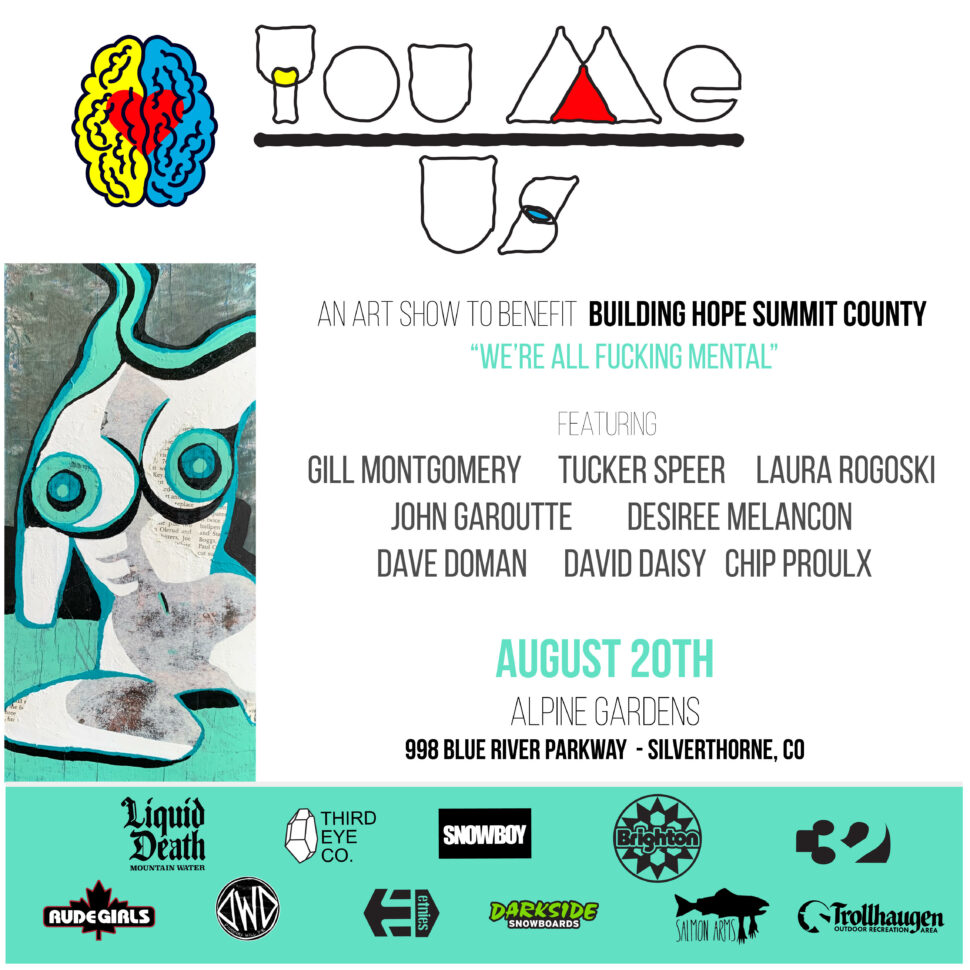
What other artists are involved in the show? How did you select the participating artists?
Gill Montgomery. Fully her idea to have a fundraiser, at her place of employment. She got the ball rolling
Tucker Speer. Good friend of Gill’s and they’d toyed with the idea of an art show in the past. Tuckers illustrates “not fitting in” and other mental struggles in a really relatable way.
John Garoutte. He was staying at my house when I was just getting started in outpatient rehab. I was really self-conscious and nervous to tell the truth about where I went each night. I was honest with John and he was super supportive. We got to talk a little about my recovery and mental health. I’ve always admired his work, so a few months later It seemed natural to ask him to team up for the show.
Davidaisy. I have a big piece of his art in my bedroom that I bought from a Boarding for Breast Cancer silent auction, so I knew he was down to support causes, haha. A lot of his work has a narrative—you can pull a story or particular emotion from it. I hit him up out of the blue and he was down.
Dave Doman. Diggers for life! I texted him, told him what was up, and he didn’t hesitate at all. We’d talked about mental health stuff in the past. Everything he donated was created specifically for the show. So amazing.
Desiree Melancon. Des has been open about her struggles with mental health online. It was hard for me to reach out to her, but I’m glad I did because she donated some powerful pieces.
Mental health is a topic that, in snowboarding, we have only started talking about more very recently. Why do you think it is so important to further this discussion?
People are dying. When Jaeger [Bailey] passed away I was thrown for a loop. I always get depressed in the winter, especially on Christmas. I saw a lot of people post stuff like, “I can’t believe it. It’s so sad, he was so successful and seemed so happy.” That’s the fucking scary part. It’s the people that don’t ask for help and put up an illusion that I’m worried about.
Instagram allows us to create our own reality—what you want people to see. My Instagram is not an accurate depiction of my life and I think that’s true for most people. Social media creates an illusion of close community. You might have 5,000 friends online, but not one friend that would notice if you didn’t get out of bed for a week.
Reaching out to people is like a muscle or skill. If you’re not used to doing it, it’s hard. Fuck, I HATED emailing so many artists and companies asking for support. It made my skin crawl. But over time, it gets easier. As a community, we need to practice checking in on each other. DM’s and posting “reach out to your friends” on your story don’t cut it. We need actual phone calls where you can hear someone’s voice and can tell how they’re feeling. No bullshit. When you’re used to calling people and getting phone calls, it’s a reflex. The next time you get a fight or flight response, you’ll instinctively pick up the phone.
If you are struggling, you can make an agreement to interact with a friend every single day. I text my AA sponsor three things I’m grateful for every morning. If I don’t, she knows to check in on me. Buddy system—if either of you start slipping, you’ll notice right away. If you don’t have anyone, reach out to me – (802) 310-3381 or Marie Hucal – (810) 333-0111. I am working on getting a contact list up on www.werefuckingmental.com of names and numbers you can call if you need support.
To this end, you are releasing a zine called MENTAL at the art show, as well. Can you explain how the idea for the zine came about?
I had the idea three years ago. After I got t-boned by a car and started my recovery process I got a lot of DM’s asking how I kept a positive attitude. I tried to respond to every one. Miles Falcon DM’ed me for advice after he broke his leg and I sent him a full email, haha. Whenever I’d see someone struggling with an injury, I wanted to reach out, to turn my painful experiences into a way to help others.
I made a rough sketch in my art journal about it, hit up Marie Hucal, and even wrote some interview questions for her. Then I healed up, started snowboarding, and got overwhelmed by the idea. I don’t like computers.
Years later, the timing seemed right. I ended up using Pages to format it because I don’t have legit applications and then I wrote everything by hand and scanned it in. It was a ton of work, but it feels more personal.
The workbook aspect of it is very cool. Why did you want to include journaling in the zine?
I’m a nerd and I love homework? It’s one thing to read something, it’s another to write it down. Writing is a physical, tangible action. It’s you showing yourself you’re serious and committed. It’s physical therapy for your brain. There are studies that show that writing three things you’re grateful for every day will make you happier. Science! It’s so simple its stupid—write shit down and your life will get better.
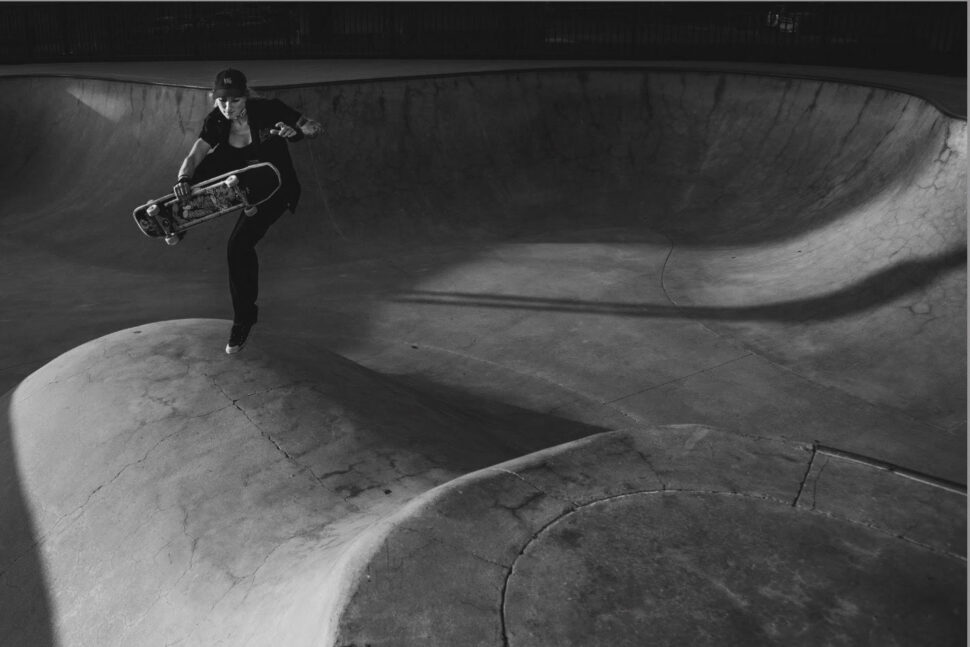 p: Lauren Pandolfi
p: Lauren PandolfiThe idea about of PT for your brain—prioritizing your mental well-being after an injury along with rehabbing your body, is so important. Even when you are aware of this, it can be hard to really internalize it, and many of us don’t even think of it to begin with, so this is a really resonating message in Mental. What has your personal experience been in terms of prioritizing your mental and emotional well-being and healing after injury?
After my initial foot break, I got wildly depressed. I had a hard time getting out of bed and brushing my teeth. I didn’t take care of myself, so my mental and physical health went to shit. When I finally got surgery on my foot, I was really aware of how quickly I slipped into depression the first time I was on crutches. I committed to doing anything it took to stay happy. I made it a priority to exercise every single day and write in a gratitude journal. It was a complete 180 from the first time. I got in better shape and the recovery process flew by.
When I was hit by a car, I took everything I learned from the foot injury and applied it. I asked friends to take me to the park so I could get outside. I insisted on pushing myself in my wheelchair to get my heart rate up. I wrote about why getting t-boned was good for me. I focused on being grateful that I was alive and that I had two legs and my face wasn’t destroyed in the crash. I felt lucky that I could do physical therapy; it wasn’t a chore anymore. Watching motivational speakers with no legs really helped me. Seeing someone worse off and still thriving, how could I feel sorry for myself when I still had so much?
If you go to a physical therapist, they give you a set of exercises. You don’t expect to get better by doing a one-hour session once a week—you’re instructed on what to do at home. Learning the exercises is the easy part, committing to doing them every day is the hard part. That’s why mental and physical health are so intertwined. I started framing my depression and addiction like recovery from an injury. Healthy daily routines, like meditating and journaling make a big difference. I didn’t expect to get strong by laying on the couch all day. I won’t get happy by watching Netflix and scrolling through Instagram. I committed to doing mental physical therapy every day.
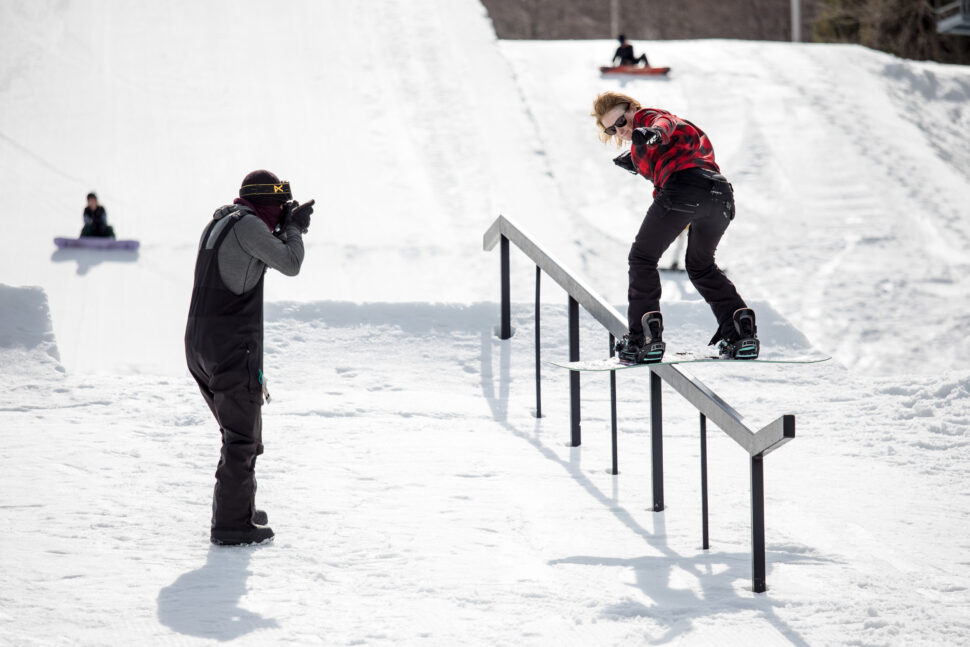 Laura is constantly one to watch at events, including SNOWBOARDER Magazine’s Ms. Superpark at Big Boulder, PA in 2019. p: Walsh
Laura is constantly one to watch at events, including SNOWBOARDER Magazine’s Ms. Superpark at Big Boulder, PA in 2019. p: WalshBuilding on what you have learned through your personal experience, you are continuing the discussion about mental health and supporting one another by organizing a Zoom support group that happens every Monday. Can you tell us a little bit about that project?
Not everyone can afford a therapist, and even if you can, it feels weird to pay someone to listen to your shit. Even if you can afford a therapist and admit you want the help, it’s hard to find the RIGHT therapist. One-on-one you control the narrative, and you’re only getting one professionals opinion. The recovery center I went to had “process groups.” We took turns talking about whatever we were struggling with and then got feedback from the group. I got more out of that than I did my individual therapy. People in the group would bring up topics I was scared to talk about and that got me to open up. I wanted to recreate the experience I got in rehab, but make it open to everyone. I called Marie Hucal and told her about my idea, and she said she had been looking for a group like that. We started it right away, and it has been really helpful.
How can people get involved with the Zoom call if they are interested?
Go on www.wereallfuckingmental.com. There is a link to the meeting—it is every Monday at 3pm Central time. If you sign up for the mailing list, you’ll get reminders on Monday, and the weekly reading. The group is anonymous and free. My goal is that once more people get interested and start showing up, we can hold another meeting at a different time.
Was there a turning point for you where you felt comfortable being able to discuss what you have been through? How did that evolve into using your experience to help others?
I lost my fucking mind. I couldn’t stop drinking and driving. I was proud of myself if I only drank three beers on hill. I hit the point where I knew I was going to die, go to jail, or get sober. I couldn’t trust myself at all, so I checked myself into an intensive outpatient center and signed up to get drug tested and breathalyzed three days a week. I thought I would stay for a few weeks then check out because “I wasn’t that bad.” I ended up staying for three-and-a-half months, four nights a week. It saved my life.
I learned that I wasn’t alone and what I was experiencing wasn’t unusual or crazy. I had PTSD, flashbacks, nightmares, so many feelings, and that it was OKAY. I didn’t need to hide it. Initially I was ashamed to tell people that I quit drinking, I was an alcoholic, I was depressed. That’s what sucks, if I had told someone I was depressed and worried about my drinking habits I might have gotten help sooner. Holding it in was killing me. Being open about it and trying to help others is helping me forgive myself.
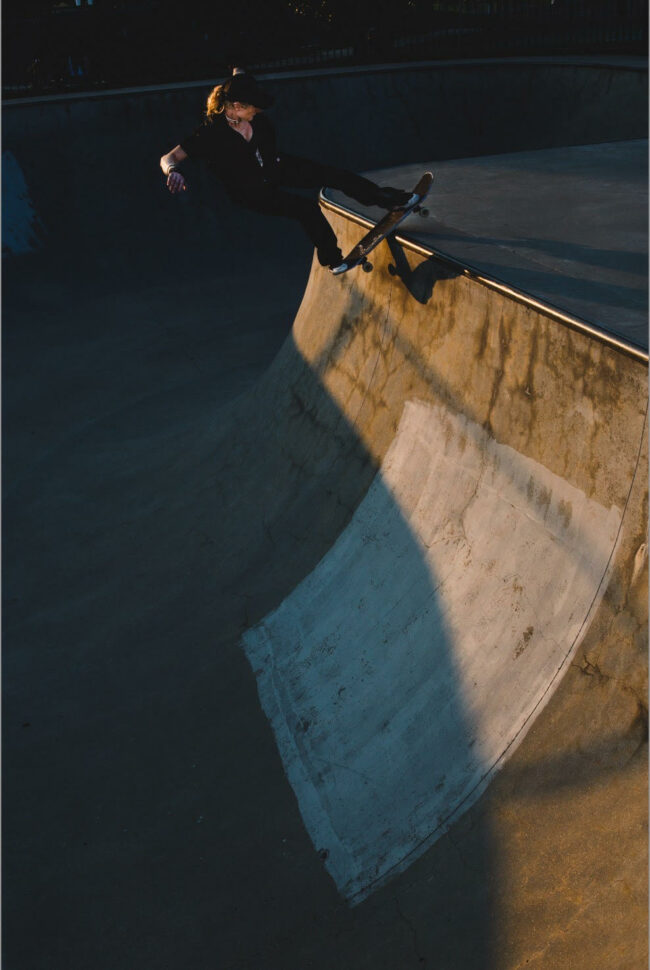 Laura’s no slouch on a skateboard, either. p: Lauren Pandolfi
Laura’s no slouch on a skateboard, either. p: Lauren PandolfiHow are you feeling in this moment, with all of this momentum in what you’re doing, and where do you want to go from here?
Emotional as fuck and the most hopeful I’ve ever been in my whole life. I’d love to raise money to help me pay to print a second issue of MENTAL. Other than that, I’m not really sure… I’m trying not to go on a future trip. I want to keep making the best choice I can for every situation, be nicer to myself, and help other people connect.
Lastly, how can people support and/or check out the art if they aren’t able to attend the art show in person/live outside CO?
More info will be on the website, www.wereallfuckingmental.com. I’m going to do a follow up show in Salt Lake City at Brighton Recovery Center in late September. (Brighton Recovery Center is in Millcreek. It’s not associated with the resort, but is a funny coincidence. When I first started treatment, I could tell people I was going to Brighton at night…and I wasn’t lying.)
And how can they get a copy of MENTAL?
It will be available on August 20th at Darkside Snowboards in VT, Milo in Salt Lake City, Prestige in Boise, People Skate shop in Michigan, Rude Girls Shop in Banff, through Third Eye Co. in Big Bear, and Christine Savage in Tahoe. Or through me in St. Paul, MN on August 21, I’m going on vacation!!
I want to give a BIG thank you to Marie Hucal for all the phone calls, listening, and brainstorming, for creating all the fliers for Instagram, and for being so committed and helping navigate this project. The mental meetup group would not have started without her. Blake Geis, for all his help and encouragement on my sobriety and this project. Alexis Roland for reaching out to me at IT’S TITS!, giving me her phone number, and getting on board with the Mental Meetup since day one. Sarah Schuster-Johnson, for creating the website and all the support. <3
For more, go to www.wereallfuckingmental.com and follow Laura on Instagram, @sk8tits.
If you are experiencing hardship with your mental health and/or substance use, SAMSHA is a resources available 24 hours a day, 365 days a year. SAMHSA’s National Helpline, 1-800-662-HELP (4357), (also known as the Treatment Referral Routing Service) or TTY, 1-800-487-4889, is a confidential, free, 24-hour-a-day, 365-day-a-year information service, in English and Spanish, for individuals and family members facing mental and/or substance use disorders. This service provides referrals to local treatment facilities, support groups, and community-based organizations. Callers can also order free publications and other information. Also visit the online treatment locators.
The post Injury Affects More Than Just Your Body: Laura Rogoski on MENTAL Zine and recovering from injury, both physically and mentally appeared first on Snowboard Magazine.




